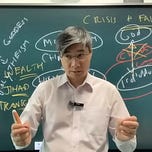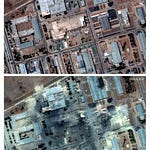July 9, 2025
Professor Jiang Xueqin pauses mid-lecture, surveying his students at a Chinese university. “You think I’m pessimistic,” he says, a slight smile playing at his lips. “But I’m simply reading the patterns. History doesn’t care about our feelings.”
This scene, recounted by one of his students, captures the essence of a thinker whose stark predictions about global collapse have begun circulating far beyond academic circles. A Yale-educated scholar who serves as Deputy Principal at some of China’s most prestigious schools—including Tsinghua University High School and Peking University High School—Jiang represents an unusual voice in geopolitical analysis. His background spans East and West: a Bachelor’s degree in English Literature from Yale, research positions at Harvard’s Graduate School of Education, and decades spent reforming Chinese education from within.
Through his “Civilization” lecture series and viral YouTube channel, Jiang has outlined a comprehensive theory of civilizational decline that connects everything from the Protestant Reformation to Bitcoin, from Putin’s war strategy to the coming “Age of Prophets.” His May 2024 prediction that Trump would win re-election and lead America into war with Iran—which drew over 680,000 views and proved remarkably prescient—transformed him from education reformer to prophet of collapse almost overnight.
CAPTION: https://www.youtube.com/@PredictiveHistory
His central thesis cuts against every assumption of modern progress: The West is spiritually exhausted, the global financial system is a house of cards, and we’re heading toward an era of civil wars, religious revival, and the fracturing of the world order. Most provocatively, he offers specific predictions—including a U.S. ground invasion of Iran by March 2027 that will trigger a Second American Civil War.
“The appeal of money and materialism is dying,” Jiang tells his students. “People are just exhausted, disillusioned, and frustrated. We are moving to an age of religious revival.”
Wait, religious revival? In our enlightened age of smartphones and space tourism? The professor isn’t joking.
The Spiritual Diagnosis
Jiang’s analysis begins not with economics or military power, but with the soul. The son of Chinese intellectuals who spent his formative years between China and the United States, he brings a unique bicultural perspective to his historical analysis. His methodology—which he calls “predictive history,” borrowing from Isaac Asimov’s concept of psychohistory—combines historical pattern recognition with game theory to forecast civilizational trajectories.
He traces the modern malaise back five centuries to the Protestant Reformation, which he argues created three revolutionary concepts: the nation-state, individuality, and money as life’s meaning.
The Reformation’s demand that individuals demonstrate true faith created what Jiang calls a “crisis of faith.” How do you prove you truly believe? The Calvinists found their answer in wealth creation—working hard and refusing to enjoy the fruits of that labor demonstrated they were among God’s elect. This Protestant work ethic, Jiang argues, became the engine of Western capitalism.
But something fundamental changed after World War II. “With the death of religion and the supremacy of capitalism in the West,” he explains, “this admonition against hedonism disappeared, which led to consumerism. This in turn has led to widespread depression, suicide, and loneliness throughout Western society.”
The statistics support his grim assessment. Despite unprecedented material wealth, rates of depression, anxiety, and suicide have soared across the developed world. Birth rates have plummeted below replacement levels. Young people report feeling hopeless about the future, even as they live in the most prosperous societies in human history. Something’s broken, and it’s not the Wi-Fi.
What replaced religious faith as society’s organizing principle? “Unfortunately, the only viable alternative seems to be the ‘cult of the self,’” Jiang observes, “in which individuals make themselves the object of worship. Thus, the obsession with achieving ‘influencer’ status, no matter the personal costs.”
The Warrior-Consumer Divide
This spiritual exhaustion, according to Jiang, has created a fundamental geopolitical vulnerability. He divides the world’s cultures into two categories: warrior cultures and consumer cultures. The distinction isn’t about military spending or weapons systems—it’s about what a population is willing to sacrifice.
“Russia and Japan have external enemies. China does not,” he explains when asked about this framework. A warrior culture emerges from existential threats that forge collective identity through shared sacrifice. A consumer culture, by contrast, organizes society around individual gratification and material comfort.
The implications are stark. “Young people do not want economic opportunities. They want status opportunities,” Jiang argues. “If Baby Boomers refuse to give up power, then young people feel there’s no future for them, and they will refuse to have children. Having children is a vote of confidence in your rising mobility in society.”
This analysis helps explain what conventional geopolitics often misses: why Russia can endure sanctions that would topple Western governments, why recruitment has become a crisis for Western militaries, and why birth rates correlate more with cultural confidence than economic development.
The U.S. military, Jiang contends, has become “an imperial bureaucracy” where “military officers are too focused on political infighting to concern themselves with geopolitical strategy.” The very traits that win wars—aggression, non-conformity, innovative thinking—are systematically purged. “Generals are not looking for fighting men,” he states flatly. “They’re looking for clerks.”
Think upon our collective sins. The world’s most expensive military machine, designed to produce PowerPoint warriors instead of actual warriors. What could possibly go wrong?
The Coming Catalysts, USA-Iran War to a Second American Civil War
Where Jiang’s analysis shifts from diagnosis to prophecy is in his specific predictions about upcoming global events. He sees the current world order as a complex system approaching multiple breaking points simultaneously.
The primary catalyst, he predicts, will be a U.S. ground invasion of Iran. Originally forecasting March 2027, he’s recently suggested it could happen as early as March 2026, driven by Trump’s fear of midterm elections and potential impeachment. “If there is a ground invasion, then Saudi Arabia, Qatar, and UAE would back the effort,” he notes.
But Iran is just the match. The kindling has been carefully arranged by what Jiang sees as Putin’s grand strategy: deliberately prolonging the Ukraine war to pin down American resources and attention. “Once America is committed to fighting Iran, he’ll start threatening the Baltic nations, and have North Korea threaten South Korea. The point is not to actually create war, but to create panic.”
The U.S., Jiang argues, will take the bait. When asked about the American public’s war-weariness, he’s dismissive. “The conditions for a civil war in America are already in place. A failed ground invasion of Iran would just be the catalyst.”
His reasoning connects back to his cultural analysis. A consumer society, built on comfort and individual gratification, cannot sustain the sacrifices required for protracted ground warfare against a warrior culture defending its homeland. The cognitive dissonance between American self-perception and military reality will tear the country apart. He envisions this not as a simple left-right conflict, but as a proxy war between elite factions: “The globalists will use the left as a proxy, and the Firsters will use the right.”
Because apparently, regular civil wars just aren’t sophisticated enough anymore.
Global Eschaton via other Civil Wars
Jiang’s vision of collapse isn’t a Hollywood apocalypse but something more insidious—a cascading failure of interconnected systems that modern life depends upon. “We take a lot of things for granted,” he warns. “That money is universally accepted. That Internet cables are well-maintained and well-protected. That we can buy anything we want as long as we have enough money.”
The Second American Civil War, in his telling, won’t be a simple Red vs. Blue conflict. Instead, it will pit two elite factions against each other: “globalists” using the left as proxy forces versus “America Firsters” mobilizing the right. “The Right will win this civil war,” he predicts. “It’s just a question of which faction of the Right will ultimately triumph.”
This internal American conflict will create a power vacuum that accelerates global fragmentation. “Nations will descend into civil war, and the authority of global institutions will wither away,” he forecasts. “There will be collapse of global technological infrastructure and environmental catastrophes. Societies will fight for precious resources (primarily water), leading to large migration flows and frequent genocides.”
The technological systems we take for granted—the Internet, GPS, AI—all require massive investment and protection from stable nation-states. “If nation-states are no longer viable entities, then neither is global technology,” Jiang points out. Even Bitcoin, often touted as a hedge against systemic collapse, depends on physical servers that can be destroyed.
So much for your crypto apocalypse bunker plans.
High-Tech Feudalism
What emerges from Jiang’s analysis isn’t quite a return to the Dark Ages, but something perhaps more unsettling—a high-tech feudalism where local strongmen control fragments of formerly global systems. He identifies likely regional hegemons: a post-civil-war United States, Israel (absorbing the U.S. military presence in the Middle East), Germany, and Japan.
“China does not have the military capacity to conquer Taiwan, and it doesn’t benefit from such an invasion,” he states, contradicting widespread Western assumptions. Instead, he envisions a cynical deal: “China agrees not to intervene on behalf of Iran, and the US agrees to return Taiwan to China.”
Russia’s fate post-Putin looks grim: “probably civil war.” The European Union will fragment, with Germany potentially forming an alliance with Russia—“what America fears the most.” Smaller nations like Canada and Australia, “vassal states” in Jiang’s terminology, face absorption or military takeover.
But the most radical transformation will be spiritual. “Ultimately the prophets will triumph,” he declares. “The question is which prophets will triumph.”
An Age of Self-Biased Techno Prophets
This religious revival won’t be a return to traditional faiths but something new and volatile. “There will be a frenetic religious revival, and there will be a splintering of religions,” Jiang predicts. He sees figures like Peter Thiel and Elon Musk as “techno-prophets” already positioning themselves for this new era, though he views Thiel as “the more effective” and strategic of the two.
The exhaustion with materialism and consumerism creates a spiritual vacuum that must be filled. But unlike past religious revivals that built civilizations, Jiang sees this as potentially destructive. “We seem to be heading towards an ‘end-times’ situation,” he observes. Not because of divine intervention, but because “powerful people are influenced by these beliefs, and warp reality to fit their beliefs. It’s a self-fulfilling prophecy.”
War itself becomes a kind of religious experience in this framework. Discussing Putin’s strategy, Jiang argues that the Russian leader “believes that only by creating eternal threats can he unite his people. Unfortunately, he may be proven right.” War provides what consumerism cannot: meaning, purpose, structure, and a reason for sacrifice.
Jiang’s Views on China
For someone predicting global collapse, Jiang is surprisingly critical of his own country. “China is a plantation economy,” he states bluntly. “Japanese love their civilization, and they will fight to preserve it. The Chinese elite exploit their population, and send their wealth and children overseas.”
This assessment challenges both Chinese nationalist narratives and Western fears of Chinese dominance. In Jiang’s view, China’s unwillingness to risk Taiwan invasion reflects deeper cultural realities—it’s a consumer culture masquerading as a civilization-state, held together by economic growth rather than genuine cultural cohesion. Not exactly what you’d expect from a Chinese professor, is it?
His personal situation reflects these contradictions. “China’s a pretty safe place for now,” he acknowledges, “but if I can find a place that welcomes my ideas and teachings then I’d move there.” He finds he needs to be “much more careful about what I say in Canada than in China,” not because of Chinese authoritarianism but because “In China, no one watches my videos—they’re not interested in geo-politics.”
Prepping for Doomsday
Despite his apocalyptic visions, Jiang offers practical advice for navigating the coming chaos. On a personal level: “Control some ‘means of production,’ possess valuable expertise/knowledge/skill, and be part of a strong, cohesive community that’s mentally prepared for the collapse of society.”
His reading recommendations are telling—not contemporary analysis but classical historians: Thucydides, Livy, Tacitus. “The study of the humanities is the basis of civilization,” he insists. “It teaches us to reflect deeply on our past, and inspires us to imagine the future.”
For societies, his prescription is both simple and impossible: “We need to re-build community and compassion. We need to learn to be kind, to have empathy, and have the courage to make sacrifices.” The very virtues that consumerism has systematically eroded.
When pressed on timeframes, Jiang is adamant that this isn’t a gradual decline but an approaching cliff. “Civil wars will rage all across the West. Resource wars will plague Asia. Famines and plagues will become common occurrences.” He doesn’t see nuclear weapons being used but expects “drastic population reduction” nonetheless.
A Prophet’s Modesty and First-Principles Thinking
Jiang’s worldview presents a paradox: his analysis gains credibility from the very trends he identifies—rising global instability, spiritual exhaustion, elite failure—yet his specific predictions invite skepticism. His forecast of a March 2027 Iran invasion provides a falsifiable test, but as he notes, “If my prediction is wrong, I re-work my model.”
This flexibility might seem like hedging, but it reflects a deeper point about his project. Jiang isn’t trying to be Nostradamus; he’s offering a framework for understanding cascading civilizational failure. The specific dates matter less than the underlying dynamics. His academic training—from Yale’s English department to Harvard’s education research—taught him to read patterns in complex texts. Now he applies that same methodology to reading patterns in history.
His journey from education reformer to geopolitical prophet wasn’t planned. After years spent trying to introduce creativity and critical thinking into Chinese schools—documented in his books “Creative China” and “Schools for the Soul”—Jiang increasingly turned his analytical lens toward broader civilizational questions. “I realized the problems in education were symptoms of something much deeper,” he explained in a recent lecture. His YouTube channel, which exploded from a handful of subscribers to over 100,000 in three days after his Trump-Iran predictions proved accurate, became his new classroom.
His harshest critics might dismiss him as another doom-monger, joining a long tradition of prophets whose predicted end times never arrive. But Jiang’s analysis differs in its systematic connection of cultural, economic, and geopolitical factors into a unified theory of decline. He’s not reading tea leaves but tracking measurable social phenomena: cratering birth rates, soaring deaths of despair, military recruitment failures, and loss of institutional trust.
Ultimately A New System Must Arise
“I think a lot about the problem of building self-sustaining self-learning ecosystems/communities,” Jiang reflects. “In a time of social breakdown and scarcity, how can communities come together to make the most of limited resources?”
This, ultimately, is the question his work poses. Whether or not his specific predictions materialize, Jiang forces a confrontation with uncomfortable possibilities. What if the complex systems we depend on are more fragile than we assume? What if spiritual exhaustion has consequences beyond individual unhappiness? What if the bill for centuries of materialism is finally coming due?
The professor who once focused on reforming Chinese education now sees his mission as preparing minds for what comes next. His students report that Jiang often ends his lectures with careful precision, leaving them to grapple with the implications. “He has this way of presenting these massive, terrifying ideas very matter-of-factly,” one student noted. “Then he just moves on to the next point like he didn’t just upend your entire worldview.”
As one student recounted: “He told us we’re living through the end of the world as we know it. Then he assigned us Thucydides and told us to think about what comes next. Classic Professor Jiang.”
In an age that rewards optimism and punishes pessimism, Jiang’s willingness to contemplate collapse might be his most radical act. Whether prophet or provocateur, he’s asking questions that few in positions of authority seem willing to consider: What if we’re not heading toward a better tomorrow? What if we’re approaching a cliff? And if we are, shouldn’t someone be thinking about what lies beyond?
The answer, according to Jiang, starts with rebuilding the very things modernity taught us to abandon: community, sacrifice, and the courage to face hard truths. Whether that’s wisdom or madness may depend on how the next few years unfold.
The implications of his analysis deserve careful consideration. Even if—especially if—they make us uncomfortable.












Share this post